Annual Report 2024
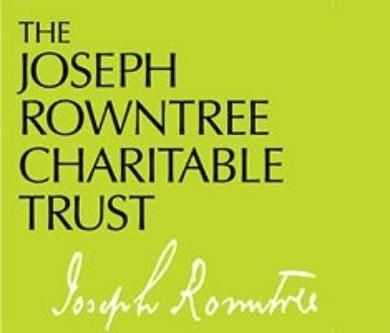
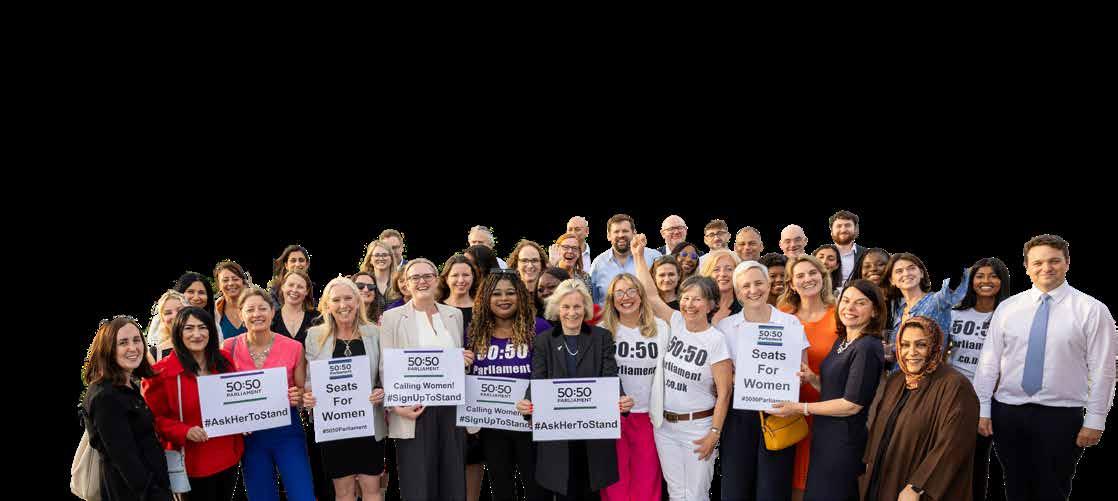


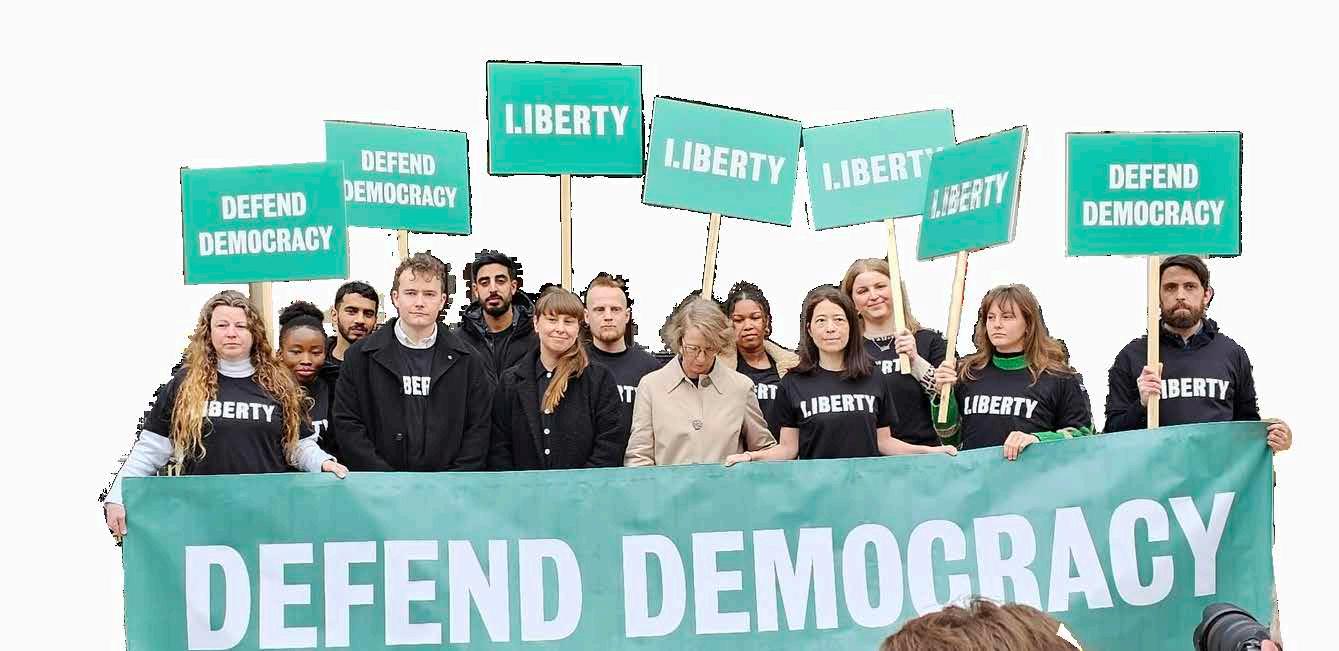

Foreword from the chair
Jonathan Heawood, chair of JRCT
I joined the Joseph Rowntree Charitable Trust as a trustee in 2024 and assumed the role of Chair at the end of the year, succeeding Huw Davies.
Having grown up in York, the birthplace of Joseph Rowntree, it is an honour to chair the Trust he founded 120 years ago, and to build on his legacy by supporting organisations and individuals working for a more just and equitable society.
In 2024 the Joseph Rowntree Charitable Trust spent £13.8 million in grant funding, supporting a diverse range of people and organisations. This funding directly supports our mission: supporting those tackling the root causes of conflict and injustice to drive systemic change.
We remained steadfast in our commitment to this mission in 2024. While undergoing a period of internal reflection and review, we prioritised the stability and resilience of our grant-holders. We reaffirmed our commitment to long-term impact by prioritising multi-year grants and providing cost of living increases to help grantees sustain their vital work.
Our grant-making is made possible by the careful stewardship of our endowment and by the knowledge and expertise held in our teams. I would like to thank the entire teamstaff, trustees and co-optees - at JRCT for the essential role they play in the running of the Trust.
We understand that many of our grantholders are facing unprecedented challenges. We have consistently heard about the urgent need for sustainable and reliable funding from people we support across all of our programmes. Recognising the immense pressures facing non-profits, we remain unwavering in our commitment to standing alongside those working on the most pressing challenges facing our society.
In addition to our grant-making, 2025 will be a year of ongoing strategic development for JRCT. We want to ensure sustained and considered support for the people and organisations doing vital work in an increasingly complex and unequal world.
“ Recognising the immense pressures facing non-profits, we remain unwavering in our commitment to standing alongside those working on the most pressing challenges facing our society.”
Chair: Jonathan Heawood

Foreword from the acting chief executive
Nicola Purdy, acting chief executive of JRCT
We work to strengthen the hands of those leading change in our society. At the end of 2024 we had a total of 340 active grants to organisations achieving wide ranging and significant impact; whether they are promoting peace in Northern Ireland, advocating for some of the most marginalised people in our society or taking steps towards an environmentally sustainable future. You can read more about their wide-ranging work in this report.

Acting chief executive: Nicola Purdy
The relationships we have with grant-holders is important to us and we continue to do what we can to be a supportive and responsive funder. As acting chief executive, I would like to express my sincere gratitude to the whole team at JRCT who are united in their care for JRCT’s mission to support those who address the root causes of conflict and injustice.
It was a year of change at JRCT. We were delighted to welcome Avila Kilmurray and Michael Gidney as trustees, Jonathan Heawood as chair and Alison Breadon as vice chair. We’re grateful to Huw Davies for his leadership as interim chair. We said farewell to Jenny Amery, Linda Batten, John Fitzgerald and Hannah Torkington who all left in 2024 and Fatima Rajina who left at the year-end – we are deeply grateful for their contributions to JRCT.
It was also a time of transition within the JRCT team as we welcomed Christine Frame, Eliza Broadbent, Farah AlHaddad, and Nancy Perez. We were grateful for the leadership of Helen Moulinos as JRCT’s interim chief executive. We were pleased to welcome some outstanding new co-opted advisors to provide valuable insights on funding and investments.
The work of the organisations and individuals we support seems more crucial than ever before. We are fortunate to have such an exceptional team dedicated to supporting their efforts. Building upon the strong foundation laid by our predecessors, we are committed to ensuring JRCT continues to be a catalyst for positive social change.
“ The work of the organisations and individuals we support seems more crucial than ever before.”
Objects and activities for the public benefit
Joseph Rowntree founded the Joseph Rowntree Charitable Trust in 1904, giving its trustees wide discretion to support charitable causes “in such manner as the trustees shall in their uncontrolled discretion think fit”.
Within this guidance trustees have carefully considered how best to use the charity’s resources for the public good, in line with guidance published by the Charity Commission under section 4 of the Charities Act 2011.
JRCT continues to pursue its goals mainly by awarding grants to charities and other non-profits. This approach is based on Joseph Rowntree’s belief that: “There may be no better way of advancing the objects one has at heart than to strengthen the hands of those who are effectively doing the work that needs to be done.”
“ There may be no better way of advancing the objects one has at heart than to strengthen the hands of those who are effectively doing the work that needs to be done.”
Joseph Rowntree

Objects and activities for the public benefit
Continued
The trustees aim to empower others with their resources, rather than keeping that power to themselves.
Joseph Rowntree believed in addressing “the underlying causes of weakness or evil in the community” rather than simply treating the symptoms. The Trust’s independent resources and structure allow its trustees to support organisations working on controversial or unpopular issues, or tackling intractable problems. The Trust’s grantmaking is guided by core Quaker values such as peace, equality, simplicity, and truth and integrity in public affairs.
Beyond grantmaking, the Trust advances its charitable goals by providing extra support to those we fund, sometimes commissioning research or other work in our areas of focus, and also through its investment strategy.
Trustees have summarised this strategy in our current statement of purpose: “We are a Quaker trust which supports people who address the root causes of conflict and injustice.”
“

We are a Quaker trust which supports people who address the root causes of conflict and injustice.”
Objects and activities for the public benefit
While the specifics of the Trust’s funding programmes may evolve yearly, the trustees believe real change requires time. Longterm engagement in a field allows the Trust to develop internal expertise and external relationships, leading to more effective and informed grantmaking.
Grants are currently awarded under six programme areas: Peace and Security, Power and Accountability, Rights and Justice, Sustainable Future, Northern Ireland, and our pilot Grassroots Movements programme. Each programme has its own grant policy, detailing specific priorities, all of which are available on the Trust’s website.
Peace and Security Power and Accountability Rights and Justice Sustainable Future Northern Ireland Grassroots Movements
The Trust primarily funds in the UK, reflecting our location and heritage and our scale of operation. The Trust also makes some grants at the pan-European level, recognising that UK and EU policies and practices influence each other, and that many of the issues we support cross national boundaries.
Activities in 2024
Tackling root causes:
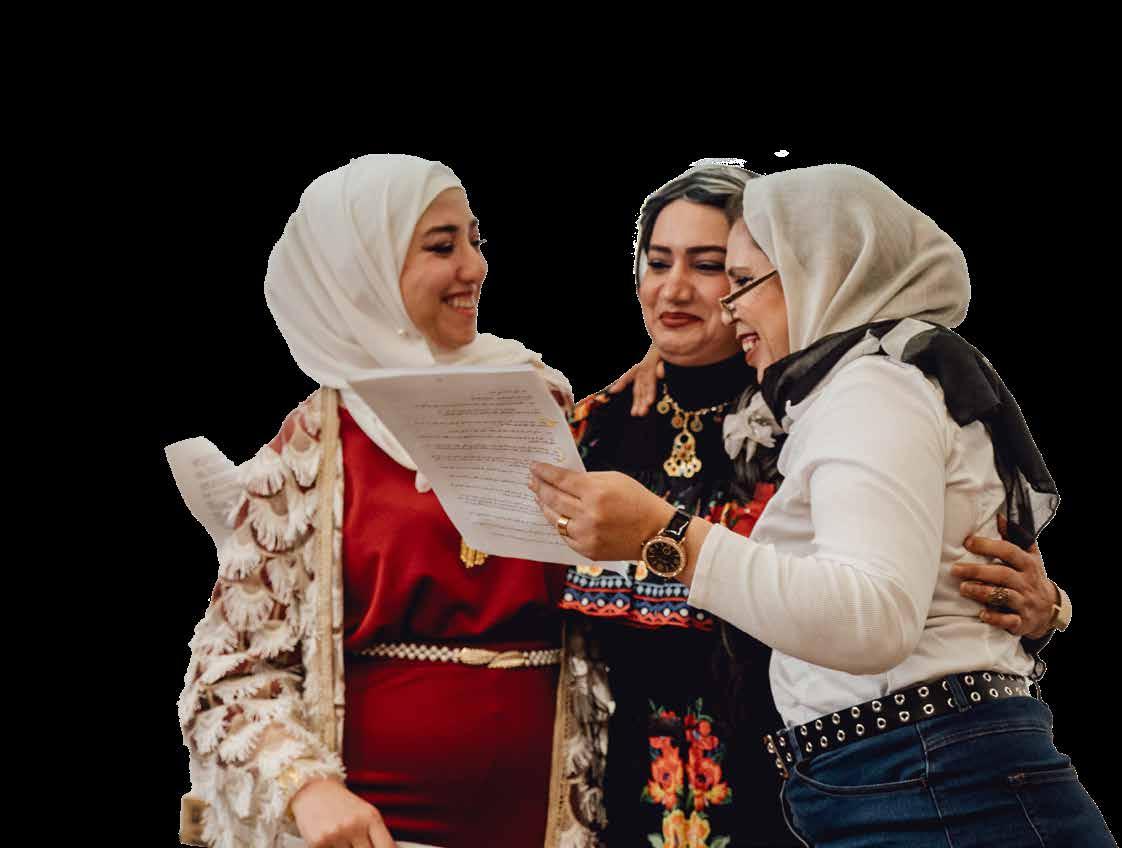
JRCT is an independent Quaker trust which makes grants to organisations and individuals working to produce positive social change through their charitable work.
By the end of 2024, the Trust had 340 active grants. These were made towards all kinds of charitable work, and to groups and entities of different sizes.
We funded grassroots groups, national charities, and lots in between. What they had in common was that they were each addressing the root causes of conflict and injustice.
In 2024 we began to review our organisational processes and funding approaches, and we remained committed to providing stability and support to existing grant-holders.
Our total grant-making expenditure was £13.8 million – which includes new grants of £9.3 million and increases and extensions to existing grants of more than £4 million. In 2025 our grant-making budget is £13.9 million.
£13.8m
Total grant-making expenditure
Activities in 2024
Being a responsive funder
largest grant five year grants Our smallest grant
55 percent were returners 45 percent were new applicants. new grants three year grants
over 75 percent of our grants spanned two years or longer
JRCT aims to be a responsive and patient funder: we recognise that systemic change takes a long time and we are willing to take the long view in our grant-making.
Our long-term perspective was reflected in the number of returning grantees in 2024: 55 percent of our 77 new grants were returners; 45 percent were new applicants.
Each of our programmes funds in a way that reflects the needs of those it serves: in 2024 we made grants ranging in size from as much as £496,000, our largest grant, to our smallest of £20,000.
Recognising the need for long-term support to drive meaningful change, we provided two five-year grants in 2024. Additionally, 23 grants were awarded for three years, and over 75 percent of our grants spanned two years or longer. We understand from sector research and from grantee feedback that multi-year funding is crucial to those we fund.
Strengthening the hands of those doing the work
Guided by Quaker values of peace, truth, integrity, simplicity, sustainability, equality, and justice, JRCT supports organisations addressing the root causes of injustice. The challenges we and our grantees face are multifaceted. We believe in a diverse range of approaches to addressing these. We trust the expertise of those on the front lines to find, develop and deliver effective solutions.
This is why we support a variety of approaches to tackling deep rooted political and social issues. These include legislative change, building power amongst affected communities, supporting research, policy and advocacy efforts, and building alternatives to the current system.
Some of our grants have visible and direct outcomes such as our funding for Cooperation Town, a food cooperative empowering communities with collective purchasing power and access to affordable food – whilst others are longer-term investments in knowledge and capacity building. This includes our support for the Department of Politics and International Relations at the University of York to develop theories of social change within the UK’s peace and security NGO sector.
Cost of living and other increases
Recognising the significant impact of rising living costs on our grant-holders, we continued to implement a ten percent cost of living increase across grant payments in 2024. This adjustment, totalling over £400,000, aimed to support grantees whose budgets did not already account for inflation. We encouraged new and returning applicants to build inflation into their multi-year budgets. Where this had not happened, we offered the ten percent uplift.

Additionally, we continued to provide enhanced support by way of increases to existing grants, exceeding £1.3 million in total. We’re committed to ensuring the sustainability and resilience of our grantees during challenging times.
10%
>£1.3m
Activities in 2024
Relational funding
To be a supportive funder, we employ skilled staff who build and maintain trusting relationships with those we fund. Grant management requires a mix of subject knowledge and the relational skills needed to work supportively with our grant holders.
In addition to grant-making our team holds expertise in finance and investment, HR, communications, operations, and governance.
To ensure the effective and responsible use of grant funds, we maintain clear and concise reporting requirements, proportionate to the grant size and complexity. While higher-risk grants may require more detailed reporting, we minimise the administrative burden on our grantees. We value open communication and build strong relationships with our grantees through regular contact. We occasionally provide access to resources and support, such as legal or communications advice, to assist them in achieving their goals.
JRCT asks all grantees to complete a closing report on each grant to help us understand the impact of the work we have funded and to help us learn and improve as a grantmaking trust. All closing reports are fed back to trustees, and common themes arising from reports are identified and reviewed.
From time to time, we support grantees and other groups working in our areas of interest to strengthen networking, to benefit from external input, or to help the Trust learn more about specific subject areas or reflect on its own practice and priorities.
We also seek to share learning with others through membership of a number of UK and international philanthropic networks and through our website and other communications.
Ask
Her To Stand parliament event: 50:50 Parliament, a Power and Accountability grant holder
We value open communication and build strong relationships with our grantees.” “

David Miko
Changes to the board
We were delighted to welcome a number of new trustees to our board in 2024 as recruitment expanded to board members beyond the Quaker community. Avila Kilmurray and Michael Gidney joined the JRCT board at the start of 2024. Fatima Rajina joined us for a year before stepping down due to professional commitments; we’re grateful to Fatima for her contributions to the work of JRCT.
In September, Jonathan Heawood and Alison Breadon joined us as trustees, Jonathan took over from Huw Davies as chair and Alison as vice chair as the year ended.
We said farewell to long-standing trustees Hannah Torkington, Jenny Amery, John Fitzgerald and Linda Batten.
Staff and co-optee recruitment
We were grateful to Helen Moulinos for her interim leadership of JRCT for much of 2024. At the end of the year Nicola Purdy stepped up from her role as head of people and operations to become acting chief executive as we begin the process to recruit a permanent CEO to lead the Trust for the longer term.
In November 2024, we were delighted to welcome Sophie Long as our new head of programmes. Sophie brings a wealth of experience to the role and she has worked for JRCT for seven years, contributing significantly to the Northern Ireland and Sustainable Future programmes.
In the wider staff team we were pleased to welcome Nancy Perez to the Grassroots Movements team, Eliza Broadbent to Peace and Security, Farah AlHaddad to the Rights and Justice team, and Christine Frame as executive assistant to the chief executive, all bringing additional expertise, knowledge and experience to our work.
We welcomed some excellent co-opted members to our committees, including Michelle Daley, Fatima Iftikhar and Josetta Malcolm to our Rights and Justice committee and Claire Lauterbach, Craig Gent, Mohammed Afridi and Swee Leng Harris to our Power and Accountability committee. Helena Coles joined our Investment committee. Earlier in the year, we welcomed Stephen Bloomer and Gerard Deane to our Northern Ireland committee.
Plans for the future
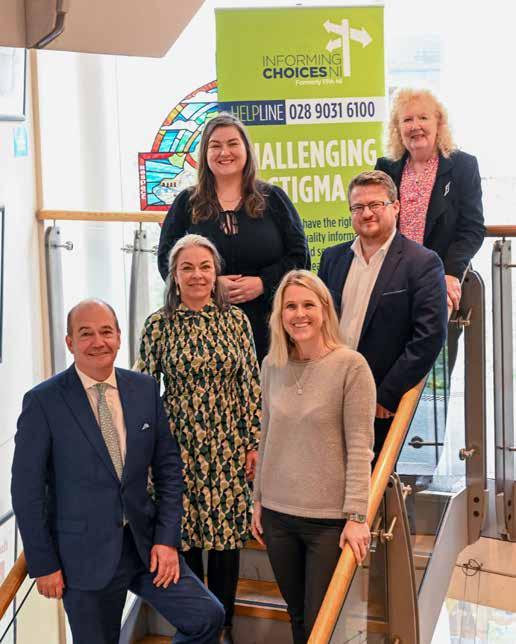
2025 will begin a process of long-term strategic planning for JRCT. We will develop a long-term vision that ensures JRCT’s continued impact and enables us to provide sustained support to organisations working to address the root causes of social injustice.
This process is expected to run from 2025 to 2027, effectively beginning the “decennial review” (a forward-looking process setting priorities for the next decade).
Trustees remain committed to a process of exploring and identifying forms of reparation which further our charitable purposes for the public benefit. Work continues to develop the approach and timeline.
We will also work to improve policies and procedures to improve grantee experience when they apply for a grant and to learn from the grants we make so we can adapt our practice accordingly and make the greatest difference with our grant-making.
All funders are grappling with a surge in demand for resources. We want to carefully consider how to best serve those working on complex long-term problems while creating space for new applicants.
“
We want to carefully consider how to best serve those working on complex longterm problems while creating space for new applicants.”
Breakdown of new programme grants
£311,000
£799,345
£1,030,326
£2,008,318
£1,025,874
2024 grants in figures
We made 77 new grants in 2024
Continued 10% 90% 45% 55%
8 of the 77 new grants were unrestricted funding. 69 of the 77 new grants made were for project funding including support costs. of the grants made were to new applicants. grants were made to returning grantees.
In addition to the above new grants, we have awarded
£4,841,357 for increases or extensions to existing grants, minus £316,948 of other accounting adjustments to grants
Adjustments made in the year to existing grants
Extensions £3,026,839
These grants totalled
£993,240 (11% of the total awarded)
Taking our total reported grant expenditure for the year to
These grants totalled £8,285,005 (89% of the total awarded)
These grants totalled £3,186,174 (34% of the total awarded)
These grants totalled £6,092,071 (66% of the total awarded)
Discretionary £1,056,247
Wellbeing £340,227
Cost of Living £418,044
£4,841,357
£13,802,654
2024 grants in figures
Number of applications in 2024
The Trust’s ten largest grants represent 28% of the total new grants. of applications received resulted in a grant
We had 340 active grants at the end of 2024.
Grants made in 2024
Peace and Security
We support approaches to defence and security which prioritise peace, non-violence and human rights.
£1,030,326 total grants
14 grant recipients
JRCT wishes to prioritise support for charitable work on the following issues:
Challenging militarism
Scrutiny of counter terrorism measures in the context of human rights and peacebuilding 3 Building support for alternative approaches to defence and security
Responding to the harms of systemic racism. You can read more about our funding priorities here.
Arcola Theatre www.arcolatheatre.com
The Shadow World Musical
£49,972 | 12 months
APPG on Extraordinary Rendition www.extraordinaryrendition.org
APPG on Extraordinary Rendition
£120,000 | 24 months
British American Security Information Council (BASIC) www.basicint.org
Scoping British Nuclear Weapons Harms (2024-2026)
£100,000 | 24 months
Centre for Military Justice
www.centreformilitaryjustice.org.uk
Core costs
£60,000 | 36 months
Connection e.V www.connection-ev.org
“The right to conscientious objection to military service: ensuring universal protection and implementation”
€119,000 | 24 months
Federation of American Scientists www.fas.org
Research and Analysis of the United Kingdom’s Nuclear Arsenal
$62,000 | 12 months
International Campaign to Abolish Nuclear Weapons www.icanw.org
Cooperation or catastrophe? Strategic engagement across environmental and nuclear abolition movements
CHF66,173 | 10 months
Grants made in 2024
Continued
New Internationalist
www.newint.org
How to stop the arms trade
£50,800 | 15 months
Ownership Futures Ltd
(Common Wealth t/a)
www.common-wealth.org
A new Common Wealth centre for research on militarism
£100,000 | 24 months
Prevent Watch Limited www.preventwatch.org
Building a Coalition –Outreach & Engagement
£110,187 | 24 months
United Nations Association Scotland www.unhscotland.org.uk
Secure Scotland
£32,000 | 24 months
University of West London
Freedom of Information and CounterTerrorism: Improving Access to Information, Transparency, and Accountability
£46,765 | 12 months
University of York, Department of Politics and International Relations
www.york.ac.uk/politics
Developing theories of social change in the UK peace and security NGO community
£88,000 | 18 months
We Are Not Numbers www.wearenotnumbers.org
We Are Not Numbers: UK set up
£60,000 | 12 months
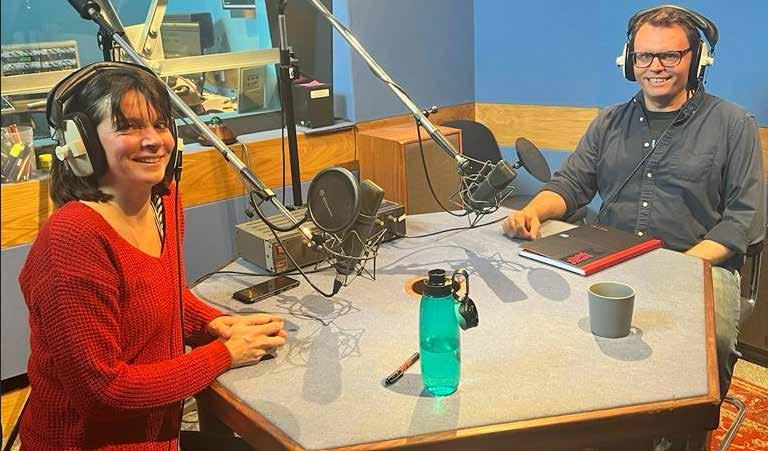
Rethinking Security, a Peace and Security grantee, recording their podcast. Image courtesy of Rethinking Security.
Grants made in 2024 Continued
Our funding priorities are:
Power and Accountability
We support those working for a world in which power is more equally shared and powerful institutions are accountable to wider society.
£1,502,083 total grants
13 grant recipients
Strengthening corporate accountability
Strengthening democratic accountability
Encouraging responsible media
You can read more about our funding priorities here.
British Deaf Association www.bda.org.uk
Deaf People are Here
£111,648 | 24 months
Climate Emergency UK www.climateemergency.uk
Climate Action Scorecards Initiative
£104,511 | 24 months
Democracy Network www.democracynetwork.org.uk
Democracy Network: Reaching wider
£156,811 | 24 months
Gambling with Lives www.gamblingwithlives.org
Core costs
£127,240 | 36 months
Generation Rent www.generationrent.org
Empowering Renters
£131,594 | 24 months
Glitch www.glitchcharity.co.uk
Core costs
£65,000 | 12 months
Index on Censorship www.indexoncensorship.org
UK Anti-SLAPP Coalition
£148,141 | 24 months
Just for Kids Law www.justforkidslaw.org
Holding the Government to account on its response to the pandemic and creating change for children and young people impacted by Covid-19
£66,600 | 36 months
Grants made in 2024
Continued
N1M Trust
https://not1more.org/about
Not1More: A Route Towards Accountability for Human Rights Violations against Environmental Protesters
£79,858 | 24 months
Research for Action www.researchforaction.uk
Local government in crisis: research and monitoring
£159,954 | 36 months
The Worker Support Centre www.workersupportcentre.org.uk
Engagement of temporary migrant workers in policymaking
£124,806 | 24 months
UK Feminista
www.ukfeminista.org.uk
Combatting the harms of commercial sexual exploitation
£155,000 | 36 months
Voice of the Listener & Viewer Ltd
www.vlv.org.uk
Shaping Public Service Broadcasting policy for the future of citizens
£70,920 | 18 months
Ask Her To Stand parliament event: 50:50 Parliament, a Power and Accountability grant holder. Image by Jennifer Stazaker, courtesy of 50:50 Parliament
Grantee focus: 50:50 Parliament is dedicated to increasing women’s representation in UK
politics.
We empower women to pursue political careers by providing support, training, and networking opportunities at all levels, from local councils to Parliament.
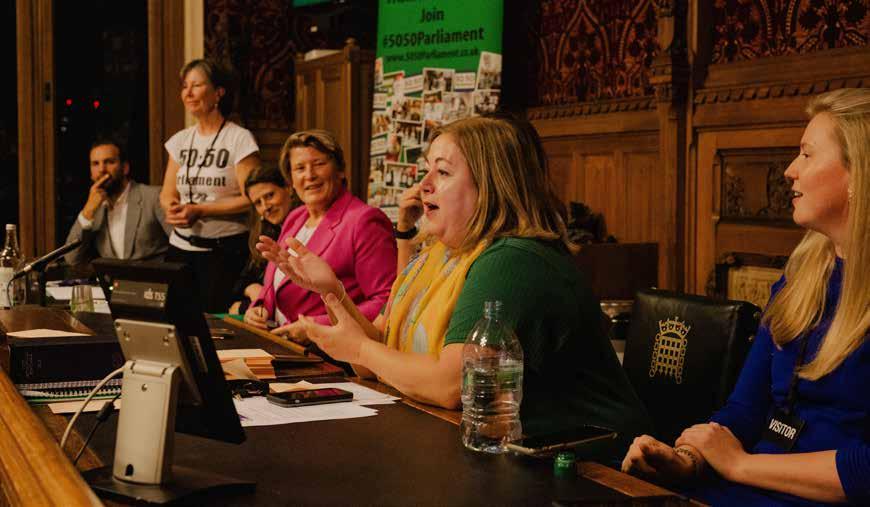
We want to raise awareness of the gender imbalance on elected bodies, including why it’s a problem, and hold Parliament to account on women’s representation in UK politics.
Our approach is effective: 101 of the women we supported across the political spectrum stood for election with 25 winning seats, resulting in a significant increase in female MPs.
Research consistently demonstrates that women in leadership prioritise crucial areas like healthcare, education, and social care. With more women in leadership, we are less likely to go to war and peace deals last longer. Women are also disproportionately affected by poverty, violence, and climate change making representation in leadership essential.
More women at the highest levels of power helps to shape a fairer more equitable society.
Lyanne
Nicholl, CEO of 50:50 Parliament
Grants made in 2024
Continued
Rights and Justice
We support those who uphold equality and human rights in support of racial and religious minorities.
£2,008,318 total grants
13 grant recipients
Our funding priorities are: 1
Protection and promotion of human rights and their enforcement in the UK 2
Promoting rights and justice for minorities who face the most severe forms of racism
3
Promotion of rights and justice for refugees and other migrants by identifying and tackling structures and systems that may deny them their rights.
You can read more about our funding priorities here.
Civil Liberties Trust www.libertyhumanrights.org.uk
Core support
£90,000 | 36 months
European Legal Support Center www.elsc.support
Fighting anti-Palestinian racism in Britain
£200,000 | 24 months
Friends of Birzeit University www.fobzu.org
Resisting the ‘Scholasticide’: Building Solidarity in the UK with Palestinian Students, Educators and Institutions
£121,192 | 24 months
IWGB (The Independent Workers’ Union of Great Britain) www.iwgb.org.uk
Organising the ‘unorganisable’: Building migrant leadership and empowering our communities
£200,000 | 36 months
Joint Enterprise Not Guilty by Association (JENGbA)
www.jointenterprise.co
Rights and Justice: Spotlight Joint Enterprise
£165,000 | 24 months
JustRight Scotland
www.justrightscotland.org.uk
Paving Routes to Justice in Scotland
£149,146 | 36 months
Leeds GATE
www.leedsgate.co.uk
Reimagine
£200,000 | 36 months
Makan Rights www.makan.org.uk
Building support for human rights and social justice through transformative education
£160,500 | 36 months
Grants made in 2024
Continued
Migrants’ Law Project
www.themigrantslawproject.org
The Migrants’ Law Project
£210,000 | 36 months
National Ugly Mugs (NUM)
www.uglymugs.org
Racial Justice for Sex Workers: Advocacy and Engagement
£96,530 | 18 months
Public Interest Law Centre
www.pilc.org.uk
Defending Gypsies and Travellers’ nomadic way of life
£74,950 | 24 months
SDS: Solidarity Detainee Support
£150,000 | 36 months
The Anne Matthews Trust www.theannematthewstrust.org
Walking The Walk Phase 2:
Implementing Our Learning
£191,000 | 12 months
Civil Liberties Trust, a Rights and Justice grant holder. Image courtesy of Civil Liberties Trust.
Grantee focus:
Civil Liberties Trust
Liberty is an independent human rights campaigning organisation founded in 1934. We employ 35 people, who collaborate with our partners to protect rights, challenge injustice and hold people in power to account.
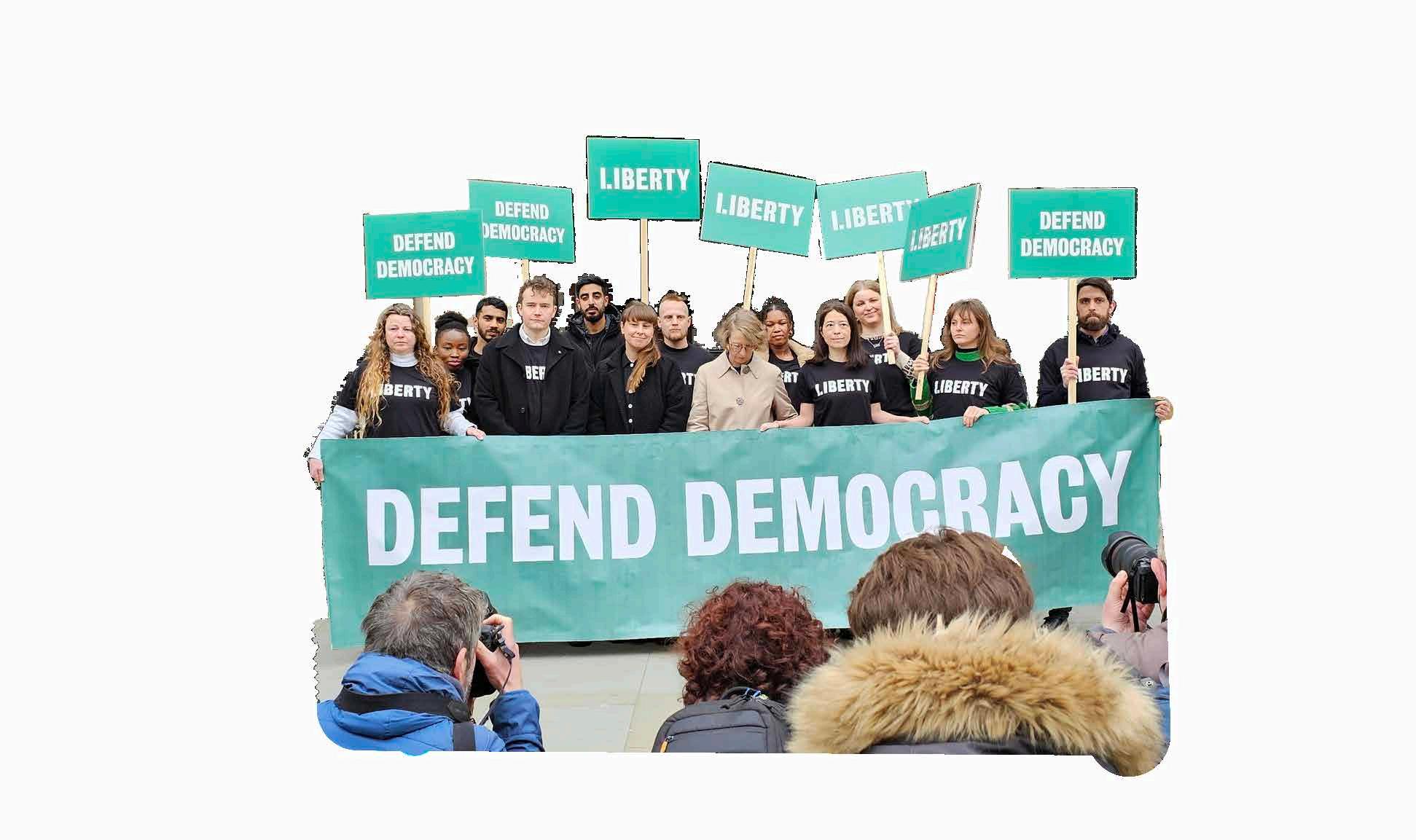
We do this through a combination of strategic litigation, parliamentary advocacy, public campaigning, investigative journalism, and movement building.
We fight injustices impacting us all but prioritise those experienced by marginalised communities. And we bring the most to issues that intersect, where the diversity of our skills can support partners and achieve a greater impact.
Right now, our work is focused on discriminatory policing including the use of facial recognition, curbing powers to limit protest, and protecting human rights tools and frameworks.
Last year wasn’t easy for anyone fighting injustice. In the summer, we saw racist, Islamophobic violence unfold across the UK, harming communities and allies we support. We issued a solidarity statement, spoke out in the press and on news programmes debunking the dangerous ‘two-tier policing’ myth, and offered support to frontline and migrants’ rights organisations. We also distributed guidance on how to hold counter demonstrations safely and within the law.
Our work won’t provide every solution to threats like these, but Liberty’s role
influencing behind the scenes, winning hearts and minds, using rights tools to challenge injustice and protect everyone’s rights, is vital, and has stood for more than 90 years.
This is ‘the fight that is never done’ as we see threats to rights and democracy multiply around the world, including the UK. But we are also seeing changes to the UK political landscape that present new opportunities. Whatever the challenges we face, we will continue working with our partners, from established NGOs to grassroots collectives and individual activists, towards our vision of a society where everyone is treated with dignity and respect.
Emma Finch, head of philanthropy at Civil Liberties Trust
Grants made in 2024 Continued
Sustainable Future
We fund imaginative and inclusive approaches to tackling the climate crisis and building a just and equitable economy in order to protect the planet for future generations.
£2,601,299 total grants
15 grant recipients
The overall focus of our funding priorities are to develop and promote sustainable, low-carbon alternatives to the current consumerist and growth-based paradigm. We will support a range of actions to achieve these aims, recognising this might include defending current policies, frameworks, and regulations.
Our funding priorities are: 1 Better economics 2 Beyond consumerism 3 New voices
You can read more about our funding priorities here.
Cooperation Town
www.cooperation.town
Cooperation Town
£496,311 | 60 months
Decolonising Economics
www.decolonisingeconomics.org
Nourishing Economics
£60,000 | 12 months
DeSmog UK
www.desmog.uk
Investigative reporting to end support for fossil fuels, enhance climate action and protect nature
£400,000 | 60 months
Drive 2 Survive CIC
www.drive2survive.org.uk
Gypsies forging Sustainable Futures 2
£198,000 | 36 months
Ecological Land Cooperative www.ecologicalland.coop
Developing affordable low-impact living solutions to support the sustainable farming revolution
£51,509 | 18 months
Europska Siet Komunitneho Organizovania www.organizeeurope.org
European Community Organisers Network Organising for a Sustainable Future
€184,000 | 24 months
Everything Must Change
Everything Must Change: Tour
£30,430 | 12 months
Fossil Free Pride
Severing Ties Between Queer Culture and the Fossil Fuel Industry
£164,500 | 24 months
Grants made in 2024
Continued
Good Ancestor Limited www.goodancestormovement.com
Accelerating the just transition: building regenerative structures for the stewardship of private capital
£180,000 | 36 months
Leave it in the Ground Initiative (LINGO) www.leave-it-in-the-ground.org Towards Defusing Carbon Bombs
€140,000 | 24 months
RadHR www.radhr.org
RadHR: Because humans are more than resources
£150,000 | 36 months
Rethinking Economics International www.rethinkeconomics.org
Educating, Organising and Agitating for a Better Economics in an Age of Crisis
£110,250 | 36 months
Retrofit Balsall Heath www.facebook.com/RetrofitBalsallHeath
Development and relationship building
£43,350 | 12 months
The Restart Project www.therestartproject.org
Working towards a ‘Right to Repair’ in the UK
£235,107 | 36 months
Welsh Centre for International Affairs (WCIA) www.wcia.org.uk
Building a powerful and diverse movement to transform society
£199,962 | 24 months
Grantee focus:
The Kindling Trust
The Kindling Trust is a social and environmental change organisation based in Manchester.
Driven by frustration with the environmental and social injustices of the mainstream food system, we develop and support progressive initiatives to change our local food system and demonstrate the potential for a radically different food economy that is equitable and sustainable.
So far we’ve set up farming projects, a community food hub and a veg box project – and in 2023, with the support of over 800 members, we collectively bought a 77-acre farm between Liverpool and Manchester. Now, we’re transforming this conventionally farmed land into an agroforestry system to farm in a way that benefits both people and the environment.
The Kindling Trust, a Sustainable Future grant holder. Image courtesy of Kindling Trust.
We’re not going to revolutionise the food system on our own, but there are a lot of people who want to join us. Being involved with the farm gives people hope that change can happen in time, and it’s easier –and much more enjoyable – together.
Helen Woodcock, co-founder and coordinator of Kindling Trust and Kindling Farm.
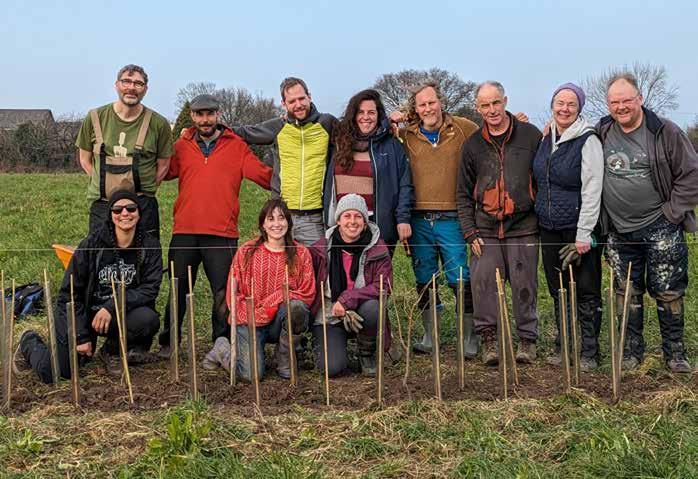
Grants made in 2024 Continued
Our funding priorities are:
Northern Ireland
We support those whose work to promote peace, equality, inclusion and human rights contributes to the ongoing transformation of the Northern Ireland conflict.
£1,025,874 total grants
8 grant recipients
Strengthening human rights and equality 2
Reimagining society 3
Cultivating peace and reconciliation
You can read more about our funding priorities here.
Grantee focus:
Voicing the Void
Voicing the Void is a grassroots organisation based in Northern Ireland that empowers vulnerable and marginalised members of our community, including at-risk young people. Our programmes emphasise personal and social development, with a strong focus on storytelling and community building.
We support people in finding their voice and using it to spark change. While there’s no pressure to share publicly, many participants choose to do so, hoping to prevent others from experiencing similar hardships.
In 2024 we worked with people with a range of experiences from victims of serious crime, to young people facing educational challenges, to those impacted by racist hate crimes.
In 2025, we plan to bring many of these stories together in a festival, creating a space for people to connect with the experiences of others across different communities in Northern Ireland. Hopefully, people will see similarities and connections, or connect with someone else’s story. That’s what our work is all about – healing through connection.
Rory Doherty, founder of Voicing the Void
Voicing the Void, a Northern Ireland grant holder. Image courtesy of Voicing the Void
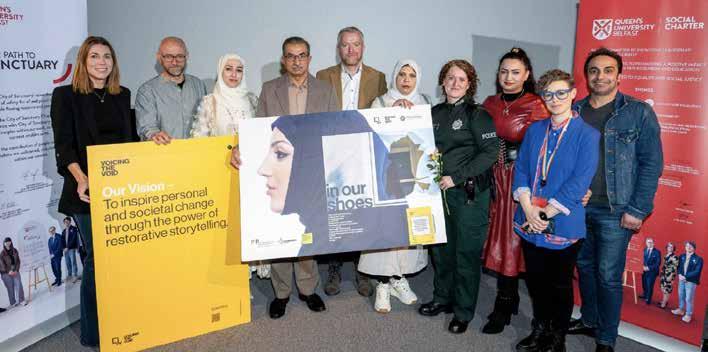
Grants made in 2024
Continued
Action for Community Transformation Initiative
www.act-ni.co.uk
Demilitarisation Programme
£65,184 | 24 months
Committee on the Administration of Justice
www.caj.org.uk
A peaceful society based on human rights and equality
£170,431 | 36 months
Creggan Enterprises Limited
www.rathmor.com
Community Dialogue programme
£20,000 | 12 months
Northern Ireland Anti-Poverty Network
www.niapn.org
Revive NIAPN
£100,259 | 24 months
Participation and the Practice of Rights Project
www.pprproject.org
Core costs
£210,000 | 36 months
Quaker Service
www.quakerservice.com
Core costs
£100,000 | 24 months
The Rainbow Project www.rainbow-project.org
Core costs
£150,000 | 36 months
Women’s Resource and Development Agency www.wrda.net
Women’s Sector Lobbyist
£210,000 | 36 months
Women’s Resource and Development Agency (WRDA), a Northern Ireland programme grant holder. Image courtesy of WRDA.
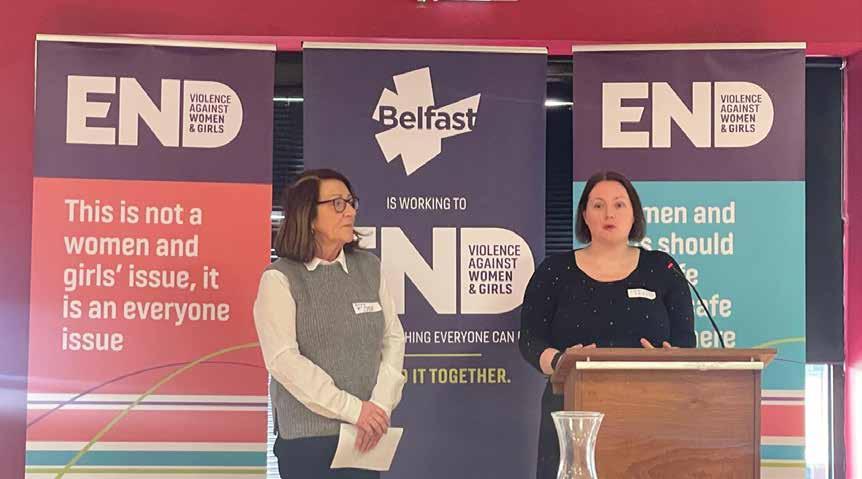
Grants made in 2024
Continued
Grassroots Movements
We support grassroots movements on the frontlines of social and environmental injustice who are striving for transformative change.
£799,345 total grants
12 grant recipients
Building Trust
CAPS Project (Community Advocacy
Pilot Strategy Project)
£80,259 | 12 months
Disabled People Against Cuts www.dpac.uk.net
Disability Justice think-tank
£73,300 | 24 months
English Collective of Prostitutes
www.prostitutescollective.net
No Bad Sex Workers, Just Bad Police
£49,214 | 24 months
Manchester Migrant Solidarity (MiSol) www.manchestermigrantsolidarity.org
Building Power Through Strong
Communities: Expanding Support for Migrant and People Seeking
Asylum Members
£77,000 | 12 months
Na’amod www.naamod.org.uk
Mobilising for Transformative Change within UK Jewish Communities
£76,950 | 24 months
Nejma Collective CIC www.nejmacollective.wordpress.com
Resisting Punishing Systems
£44,902.20 | 24 months
Pan-African Workers’ Association (PAWA)
www.pawa.uk
Supporting African migrant workers to join the working class movement
£80,000 | 24 months
SCALP (Scottish Community & Activist Legal Project)
scalp.org.uk
Empowering Action in Scotland
£32,060 | 24 months
Sistren Legal Collective
www.sistren.co.uk
Sistren Legal Collective
£77,000 | 24 months
Trans Action for Housing Justice
https://linktr.ee/TransHousingJustice
Trans Action for Housing Justice
£76,995 | 24 months
Unis Resist Border Controls
https://linktr.ee/urbc
Toward a more informed and organised resistance of the hostile environment in higher education
£65,665 | 24 months
Grants made in 2024 Continued
£311,000 total grants
2 grant recipients
Friends Provident
Charitable Foundation
www.friendsprovidentfoundation.org
Foundation Practice Rating: assessing the diversity, accountability and transparency of UK philanthropic practices
£50,000 | 36 months
Quaker Council for European Affairs
www.qcea.org
Justice and peace in a time of climate crisis
€300,000 | 36 months
Investments Approach to investment
We are clear that we cannot manage our investments in isolation and that the investments we make, and our behaviour as an investor, have a role in helping achieve the overall aims and objectives of the Trust.
Accordingly, four main principles underlie our approach to investment. These are that we should:
• Be able to fund the Trust’s grant-making programmes over the long term
• Invest in enterprises which seek to realise our aims
• Avoid investing in corporations whose activities conflict with our aims
• Encourage business to be ethical, socially responsible and to protect the environment.
To this end we choose to invest through managers who regard themselves as responsible investors and seek to invest sustainably. By adopting this approach, we can have confidence that the companies in which we are invested are a good match for our ethical concerns. We also believe that those companies which recognise future trends, whether they be the immediate impact of climate change or the movement towards greater transparency, accountability and fairer reward systems, are most likely to outperform in the long term.
As a long-term investor, we choose to invest almost entirely in global equities. We appreciate that, because of this, the value of the portfolio is likely to be volatile and therefore that we need to keep the Trust’s investment performance and spending policy under review.
Our approach to investment is explained further in our investment strategy which is available on our website at www.jrct.org.uk.
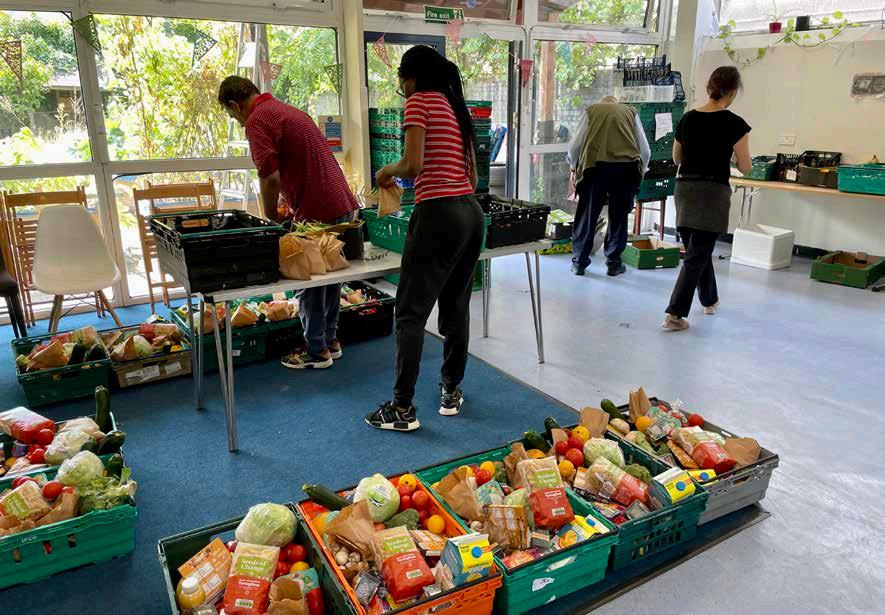
Investment portfolio
As at 31 December 2024 our externally managed investments represented almost 100% of our portfolio (2023: almost 100%). They were all invested through equity funds managed on a total return basis. Our externally managed investments are now all in global equity funds, invested in listed equities with four fund managers all chosen for the alignment of their strategies with our values as a responsible investor.
During the year there were no further payments as part of our committed investment into the Generation Sustainable Solutions Fund III, although of the remaining £0.7 million committed at year-end, £0.2 million has been paid since the year-end. In making this investment a number of years ago, as a long-term investor we felt that we could afford to accept less liquidity on this relatively small private equity investment in the hope of generating higher long-term returns. Currently this investment represents 3% of our portfolio.
The small number of investments we manage ourselves are social investments and represent less than 1% of the portfolio. These investments are in the Ethical Property Company, Mundo-Lab (formerly Ethical Property Europe) and the Social Justice and Human Rights Centre.
More detailed information on our funds and directly held investments can be found on our website at www.jrct.org.uk.
Investment performance and future plans
In reviewing investment performance, we take a long-term view of performance as is appropriate for our time horizon and we have an above average risk tolerance. We monitor the market value of our fund holdings and other securities using returns over a threeyear period.
In 2024, our global equities portfolio returned 8.5% underperforming its benchmark of MSCI All Countries World Index by 11.1%, and over 3 years returned 0.03% per annum (underperformance against benchmark 8.2%).
This is as we would expect in recent market conditions given the nature of our investment strategy which aligns with the Trust’s values and expressly excludes fossil fuels.
The portfolio is heavily skewed to a quality growth style. This has faced multiple headwinds over the past three years, including high inflation and a surge in performance of energy stocks followed by a period of extremely narrow markets, led by a small number of technology and AI-themed stocks.
This underperformance reflects the dominance in investment markets of a small number of companies which do not fit our investment strategy, and factors such as continuing high inflation, and we remain confident in the long-term ability of our investment strategy to continue to deliver positive returns.
In pursuing the Trust’s long-term investment policy as described above, we recognise the limitations of comparing performance to a benchmark and therefore only regard our benchmark as a guide.
We have reviewed the Trust’s investment performance during 2024 and since the end of the financial year. While we are aware of investment risks, we remain confident that the theoretical case for us to invest primarily in equities and in a responsible and sustainable manner is borne out in practice.
Review of investment activities Investment governance
During 2024 we continued to actively oversee our whole portfolio both as a responsible investor and with an eye to returns. Our Investment Committee, which refers back to the Trust board, is supported in its work by four co-opted members with a professional investment background.
In 2024 we decided to change from having an individual independent investment advisor, and appointed Redington as our investment consultants. This will further strengthen the skills and resources available to us and we are very much looking forward to working with them.
During 2023 the reviews of our managers led to us reducing the number from five to four, and throughout 2024 and at the year-end we were still holding some of the proceeds withdrawn in a high-yielding cash deposit fund, while drawing down from these funds for our operational and grantmaking cash requirements.
Our usual practice is to meet twice a year with our managers. At one meeting we look at performance and asset allocation and at the other we concentrate primarily on ESG (environmental, social and governance) issues.
PRI (Principles for Responsible Investment)
Rising to our commitment as a signatory to PRI we also held our managers to account throughout the year on their general engagement activities.
Membership organisations
We are a member of the Church Investors Group, the Charities Responsible Investment Network, the Institutional Investors Group on Climate Change (IIGCC) and the UK Sustainable Investment and Finance Association (UKSIF). We are also an investor signatory to the CDP (Carbon Disclosure Project). Through these networks and other collaborative initiatives we engaged directly with companies and policy makers on a range of issues.
Fossil fuels
We are divested from fossil fuel extractive companies.
Finance
Financial review
Income in 2024 was £3.5 million (2023: £2.9 million). This is primarily the income of £3.504 million from our investments (2023: £2.941 million). We also received unrestricted donations of £5k (2023: £3k).
Our relatively modest level of investment income compared with the size of the endowment reflects the fact that we are predominantly invested in managed investment funds run on a total return basis where the majority of the returns are in the form of capital, although we have seen an increase in income in recent years with higher interest rates increasing the return on our cash funds.
Expenditure allocated to charitable activities in the year was £17.3 million (2023: £22.8 million), principally being grants expenditure.
The grants expenditure in the year of £13.803 million (2023: £20.032 million) comprised £9.278 million (2023: £16.359 million) of new grants awarded, £4.841 million (2023: £3.818 million) of increases or extensions to existing grants, minus £0.316 million (2023: £0.145 million) of other adjustments including write-offs of closed grants. In 2023 we had continued our increased funding levels in response to the Covid-19 pandemic and the wider external context including the cost of living crisis; in 2024 we reduced to a more sustainable funding level while continuing to award some wellbeing and cost of living increases in grants in 2024.
The amount spent in the year on generating funds was £1.8 million (2023: £1.9 million) which is primarily fees paid to our investment managers.
Our investment portfolio reported gains in the year, with the accounts showing gains on investments of £21.7 million (2023: £32.0 million).
The value of the Trust’s net assets increased to £284.9 million (2023: £278.8 million).
£3.5m
Income
Fundraising practice
2023: £2.9 million
Charitable expenditure
£17.3m
2023: £22.8 million
Reported gains
£21.7m
2023: £32.0 million
Net assets
£284.9m
2023: £278.8 million
The Trust does not undertake fundraising from the general public and does not use professional fundraisers or commercial participators.
The income of the Trust is therefore not bound by any regulatory scheme, and the Trust does not have a requirement to comply with any voluntary code of practice relating to fundraising.
As such, we have received no complaints in relation to any fundraising activities. As we do not approach individuals for the purpose of raising funds, we do not have specific requirements related to fundraising activities, nor do we consider it necessary to design specific procedures to monitor such activities.
Spend policy
In 2018, as part of our decennial review, we agreed that, for the next ten years, we would operate on the basis of a fixed total spend (to cover grant and non-grant expenditure, net of investment fees) to be increased by our grant inflator annually. We agreed that the starting level for this expenditure would be £11.7 million for 2019, based on a forecast of potential sustainable spend provided by a reputable investment house. We recognise that there is no certainty in that regard but also that trustees have freedom to spend at whatever level they see fit. We welcome and celebrate the opportunities that this new spend level has brought.
In 2020 we agreed further increased spending in response to the Covid-19 crisis, and since then we have continued to provide higher levels of supplementary support to our grantees in response to the continued challenges of the Covid-19 pandemic and the wider external context including the Cost of Living crisis. We are now reducing our expenditure to a more sustainable level, whilst continuing to provide support above the level anticipated in 2018. We will consider our long-term spending plans as part of our decennial strategic review.
Reserves policy
We aim to maintain a free reserve of cash and cash equivalents sufficient to respond to applications for grants and ensure that the costs of raising funds (excluding fund manager fees, which are met out of our investments), governance and support are covered without becoming a forced seller of equities should there be a downturn in the market. That said, if prudent portfolio management demands it, we are prepared to hold as cash and cash equivalents up to three years of unrestricted expenditure net of income from investments.
In setting this level of free reserves, we are mindful that all the Trust’s funds are in fact unrestricted and that, in the case of urgent need, further liquid assets can be generated. The balance held as unrestricted funds at 31 December 2024 was £284.9 million (2023: £278.8 million), of which £37.3 million (2023: £55.0 million) was held as available reserves in cash, short-term deposits or liquid cash-based funds. Budgeted expenditure before any income in 2025 is £18.2 million.
Given this, we believe that the current level of free reserves is reasonable.
Going concern
The balance held as unrestricted funds at 31 December 2024 totalled £284.9 million. This figure reflected all known liabilities as at the balance sheet date and there were no material uncertainties. This sum comprised of assets totalling £306.0 million and creditors totalling £21.1 million, principally grant commitments payable over a number of years. Of the assets, £295.3 million were in liquid form (cash or cash equivalents) or near liquid form (quoted equities).
Given the strength of the Trust’s unrestricted reserves, its liquidity position and our attitude to expenditure levels, we are confident that the Trust will remain a going concern for the foreseeable future.
Remuneration policy
We are a living wage employer.
The policy of the Trust is that those employed by it are fairly remunerated for the necessary skills and experience they bring to the work of the Trust, and for the responsibilities they undertake on its behalf. The pay policy is agreed by the trustee body and is consistent across all posts in JRCT. The principle of equal pay for work of equal value is adhered to.
A full pay review is carried out periodically, with the last review having taken place in 2016. External consultants are commissioned to assess current salary scales in relation to UK endowed grant-making charities of similar size and with a national UK remit, as per the Trust’s pay policy. Trust policy is that salaries are set at levels at least as good as the median paid by comparator trusts.
Staff receive an annual cost of living award with effect from 1 April each year, which is approved by trustees following consideration of factors including the Retail Prices Index and the Average Weekly Earnings Index.
Under the Trust’s scheme of delegation, authority to set the salaries of new posts is delegated to the Chief Executive, in consultation with the Chair of Operations and Finance Committee for senior roles. As an exception to this, Operations and Finance Committee sets the salary to be paid on the appointment of a new Chief Executive.
PEACH, the People’s Empowerment Alliance for Custom House, is a Grassroots Movements grantee. Image courtesy of PEACH.

Governance and management
The Joseph Rowntree Charitable Trust, a charity registered in England and Wales, (number 210037), was founded in 1904.
Our governing document is a deed of variation dated May 13, 2024, of a declaration of trust from November, 6, 1939, as amended in 1968, 1990, 1998, 2006, 2022 and 2024.
JRCT is governed by a board of up to 14 trustees. New trustees serve a maximum term of ten years, renewable every five years. The chair and two vice chairs are appointed by trustees and serve a five-year term, open for renewal once.
Historically, trustee recruitment drew on elements of Quaker nominations practice and while some parts of this process remain, JRCT consciously opened recruitment to non-Quakers in 2023 to encourage broader participation. The board initiates recruitment by determining the number of trustees needed and the desired skills and qualities, emphasising a diversity of perspectives and experiences.
A sub-group of trustees, supported by staff, oversees the recruitment process to the board. While vacancies are typically advertised, JRCT may also seek recommendations or directly approach potential trustees with relevant skills. All candidates are required to provide an expression of interest, a CV and references.
All trustee appointments are made by the full Trust board and new trustees undergo an induction process.
Trustees meet as a full board at least four times a year, including dedicated time for trustee-only discussions. Some trustees also participate in grant assessment through programme committees. The full board consider and approve all grants over £200,000, as well as high-risk grants. This threshold is reviewed annually by trustees. Trustees also oversee the Trust’s investments and operations through dedicated committees.
The trustees are supported in their role by staff and also take external advice when needed. Day-to-day administration of JRCT is delegated to the chief executive. A written scheme of delegation is maintained.
Conflicts of interest and related parties
The Trust has a written conflict of interest policy for trustees, co-optees, staff and advisors aligned with statutory guidance and the Trust deed. More information about related parties can be found in note 9 of the financial statements.
Risk management
Trustees are responsible for the management of the risks faced by the Trust, and consider a range of different types of risks as follows:
Strategic
and operational risks
The board of trustees considers an update on risks, and mitigating actions, at least once a year. Risks are considered under the themes of board governance, leadership and management, people, financial sustainability, financial management, grant-making, reputational, information management and facilities.
The principal strategic risks facing the Trust during 2024 were identified as follows:
• Lack of diversity among the board and senior leadership team
• Staff management and capacity challenges arising from organisational growth, increase in grant-making and the scale of work associated with addressing the origins of the endowment.
For each of these risks, mitigating actions have been identified or are in the process of being developed and implemented. As part of the board’s commitment to ensure a board more representative of wider society, last year we changed the Trust deed to enable the appointment of trustees from outside the Quaker community and in 2024 we have welcomed non-Quaker trustees onto the board.
The staff management and capacity challenges created by the vacant chief executive post and other senior vacancies were monitored with trustees approving additional temporary resource where necessary to mitigate this. This included the appointment of an interim chief executive for a period during 2024.
Grant-making risks
The Trust’s grant-making model and commitment to tackling the root causes of conflict and injustice also requires us to manage a higher-than-average level of risk associated with our grants, and we aim to support our grantees to do the same. The Trust has a grant risk management framework which we use to identify and assess risk as part of our due diligence. Risk is discussed with grant applicants as part of the assessment process, and strategies for mitigating risk by the Trust and the applicant are considered. When grant decisions are taken, the Trust identifies whether extra measures are necessary to support the grantee, and whether additional monitoring is required. Grants that are considered to be high-risk are considered by the full Trust board before approval.
Financial risks
The principal financial risk is of significant investment losses through the poor investment management of our predominantly equity-based portfolio. We mitigate this risk by ensuring that our portfolio is properly diversified across industry sectors and geographical markets. The majority of our funds are invested through four external managers with different investment styles. We monitor them closely, using an independent consultant to assess and report to us on their performance. Our trustees themselves actively review our internally managed investments on an ongoing basis.
While we are comfortable with the level of risk inherent in equity markets, we keep our strategic asset allocation and all our investments under close review. That said, at all times we avoid speculative and opaque investments and other investments that we do not understand. Our investment consultant supports us on managing investment risk and our co-opted members on investment committee ensure that the committee membership itself has an adequate skills base.
Statement of trustees’ responsibilities in respect of the trustees’ annual report and the financial statements
The trustees are responsible for preparing the trustees’ annual report and the financial statements in accordance with applicable law and United Kingdom Accounting Standards (United Kingdom Generally Accepted Accounting Practice).
The law applicable to charities in England and Wales requires the trustees to prepare financial statements for each financial year which give a true and fair view of the state of affairs of the charity and of the incoming resources and application of resources of the charity for that period. In preparing these financial statements, the trustees are required to:
• Select suitable accounting policies and then apply them consistently
• Observe the methods and principles in the Charities SORP
• Make judgements and estimates that are reasonable and prudent
• State whether applicable accounting standards have been followed, subject to any material departures disclosed and explained in the financial statements, and
• Prepare the financial statements on the going concern basis unless it is inappropriate to presume that the charity will continue in operation.
The trustees are responsible for keeping proper accounting records that disclose with reasonable accuracy at any time the financial position of the charity and enable them to ensure that the financial statements comply with the Charities Act 2011, the Charity (Accounts and Reports) Regulations 2008 and the provisions of the Trust Deed. They are also responsible for safeguarding the assets of the charity and hence for taking reasonable steps for the prevention and detection of fraud and other irregularities.
The trustees are responsible for the maintenance and integrity of the charity and financial information included on the charity’s website. Legislation in the United Kingdom governing the preparation and dissemination of financial statements may differ from legislation in other jurisdictions.
Approved by trustees on 15 March 2025 and signed on their behalf by:
Independent auditor’s report to the trustees of The Joseph Rowntree Charitable Trust
Opinion
We have audited the financial statements of The Joseph Rowntree Charitable Trust (the ‘charity’) for the year ended 31 December 2024 which comprise the statement of financial activities, balance sheet, statement of cash flows and notes to the financial statements, including significant accounting policies. The financial reporting framework that has been applied in their preparation is applicable law and United Kingdom Accounting Standards, including FRS 102 The Financial Reporting Standard applicable in the UK and Republic of Ireland (United Kingdom Generally Accepted Accounting Practice).
In our opinion, the financial statements:
• Give a true and fair view of the state of the charity’s affairs as at 31 December 2024 and of its incoming resources and application of resources, for the year then ended
• Have been properly prepared in accordance with United Kingdom Generally Accepted Accounting Practice
• Have been prepared in accordance with the requirements of the Charities Act 2011.
Basis for opinion
We conducted our audit in accordance with International Standards on Auditing (UK) (ISAs (UK)) and applicable law. Our responsibilities under those standards are further described in the Auditor’s responsibilities for the audit of the financial statements section of our report. We are independent of the charity in accordance with the ethical requirements that are relevant to our audit of the financial statements in the UK, including the FRC’s Ethical Standard and we have fulfilled our other ethical responsibilities in accordance with these requirements. We believe that the audit evidence we have obtained is sufficient and appropriate to provide a basis for our opinion.
Conclusions relating to going concern
In auditing the financial statements, we have concluded that the trustees’ use of the going concern basis of accounting in the preparation of the financial statements is appropriate.
Based on the work we have performed, we have not identified any material uncertainties relating to events or conditions that, individually or collectively, may cast significant doubt on The Joseph Rowntree Charitable Trust’s ability to continue as a going concern for a period of at least twelve months from when the financial statements are authorised for issue.
Our responsibilities and the responsibilities of the trustees with respect to going concern are described in the relevant sections of this report.
Other Information
The other information comprises the information included in the trustees’ annual report, other than the financial statements and our auditor’s report thereon. The trustees are responsible for the other information contained within the annual report. Our opinion on the financial statements does not cover the other information and, except to the extent otherwise explicitly stated in our report, we do not express any form of assurance conclusion thereon. Our responsibility is to read the other information and, in doing so, consider whether the other information is materially inconsistent with the financial statements or our knowledge obtained in the course of the audit or otherwise appears to be materially misstated. If we identify such material inconsistencies or apparent material misstatements, we are required to determine whether this gives rise to a material misstatement in the financial statements themselves. If, based on the work we have performed, we conclude that there is a material misstatement of this other information, we are required to report that fact.
We have nothing to report in this regard.
Independent
auditor’s report to the
trustees of The Joseph Rowntree Charitable Trust
Matters on which we are required to report by exception
We have nothing to report in respect of the following matters in relation to which the Charities (Accounts and Reports) Regulations 2008 requires us to report to you if, in our opinion:
• The information given in the trustees’ annual report is inconsistent in any material respect with the financial statements;
• Sufficient accounting records have not been kept; or
• The financial statements are not in agreement with the accounting records and returns; or
• We have not received all the information and explanations we require for our audit.
Responsibilities of trustees
As explained more fully in the statement of trustees’ responsibilities set out in the trustees’ annual report, the trustees are responsible for the preparation of the financial statements and for being satisfied that they give a true and fair view, and for such internal control as the trustees determine is necessary to enable the preparation of financial statements that are free from material misstatement, whether due to fraud or error.
In preparing the financial statements, the trustees are responsible for assessing the charity’s ability to continue as a going concern, disclosing, as applicable, matters related to going concern and using the going concern basis of accounting unless the trustees either intend to liquidate the charity or to cease operations, or have no realistic alternative but to do so.
Auditor’s responsibilities for the audit of the financial statements
We have been appointed as auditor under section 144 of the Charities Act 2011 and report in accordance with regulations made under section 154 of that Act.
Our objectives are to obtain reasonable assurance about whether the financial statements as a whole are free from material misstatement, whether due to fraud or error, and to issue an auditor’s report that includes our opinion. Reasonable assurance is a high level of assurance, but is not a guarantee that an audit conducted in accordance with ISAs (UK) will always detect a material misstatement when it exists. Misstatements can arise from fraud or error and are considered material if, individually or in the aggregate, they could reasonably be expected to influence the economic decisions of users taken on the basis of these financial statements.
Irregularities, including fraud, are instances of non-compliance with laws and regulations. We design procedures in line with our responsibilities, outlined above, to detect material misstatements in respect of irregularities, including fraud. The extent to which our procedures are capable of detecting irregularities, including fraud are set out below.
Capability of the audit in detecting irregularities
In identifying and assessing risks of material misstatement in respect of irregularities, including fraud and non-compliance with laws and regulations, our procedures included the following:
• We enquired of management and the operations and finance committee, which included obtaining and reviewing supporting documentation, concerning the Trust’s policies and procedures relating to:
Independent
Continued
auditor’s report to the trustees of The Joseph Rowntree Charitable Trust
– Identifying, evaluating, and complying with laws and regulations and whether they were aware of any instances of non-compliance;
– Detecting and responding to the risks of fraud and whether they have knowledge of any actual, suspected, or alleged fraud;
– The internal controls established to mitigate risks related to fraud or noncompliance with laws and regulations.
• We inspected the minutes of meetings of those charged with governance.
• We obtained an understanding of the legal and regulatory framework that the Trust operates in, focusing on those laws and regulations that had a material effect on the financial statements or that had a fundamental effect on the operations of the Trust from our professional and sector experience.
• We communicated applicable laws and regulations throughout the audit team and remained alert to any indications of non-compliance throughout the audit.
• We reviewed any reports made to regulators.
• We reviewed the financial statement disclosures and tested these to supporting documentation to assess compliance with applicable laws and regulations.
• We performed analytical procedures to identify any unusual or unexpected relationships that may indicate risks of material misstatement due to fraud.
• In addressing the risk of fraud through management override of controls, we tested the appropriateness of journal entries and other adjustments, assessed whether the judgements made in making accounting estimates are indicative of a potential bias and tested significant transactions that are unusual or those outside the normal course of business.
Because of the inherent limitations of an audit, there is a risk that we will not detect all irregularities, including those leading to a material misstatement in the financial statements or non-compliance with regulation. This risk increases the more that compliance with a law or regulation is removed from the events and transactions reflected in the financial statements, as we will be less likely to become aware of instances of non-compliance. The risk is also greater regarding irregularities occurring due to fraud rather than error, as fraud involves intentional concealment, forgery, collusion, omission or misrepresentation.
A further description of our responsibilities is available on the Financial Reporting Council’s website at: www.frc.org.uk/ auditorsresponsibilities. This description forms part of our auditor’s report.
Use of our report
This report is made solely to the charity’s trustees as a body, in accordance with section 144 of the Charities Act 2011 and regulations made under section 154 of that Act. Our audit work has been undertaken so that we might state to the charity’s trustees those matters we are required to state to them in an auditor’s report and for no other purpose. To the fullest extent permitted by law, we do not accept or assume responsibility to anyone other than the charity and the charity’s trustees as a body, for our audit work, for this report, or for the opinions we have formed.
27 March 2025
Sayer Vincent LLP, Statutory Auditor 110 Golden Lane, LONDON, EC1Y 0TG
Sayer Vincent LLP is eligible to act as auditor in terms of section 1212 of the Companies Act 2006
Financial Statements
Statement of financial activities for the year ended 31 December 2024
All income and expenditure in both years was unrestricted.
All of the above results are derived from continuing activities. There were no recognised gains or losses other than those stated above.
Approved by the trustees on 15 March 2025 and signed on their behalf by: Jonathan Heawood, Chair of TrusteesAlison Breadon, First Vice Chair
Statement of cash flows
Notes to the financial statements for the year ended 31 December 2024
1.Accounting policies
Organisation address and country of registration
The Joseph Rowntree Charitable Trust is an unincorporated charity, registered with the Charity Commission in England and Wales (number 210037). The registered office is The Garden House, Water End, York, YO30 6WQ.
Basis of preparation
The financial statements have been prepared in accordance with Accounting and Reporting by Charities: Statement of Recommended Practice applicable to charities preparing their accounts in accordance with the Financial Reporting Standard applicable in the UK and Republic of Ireland (FRS 102) –(Charities SORP FRS 102), the Financial Reporting Standard applicable in the UK and Republic of Ireland (FRS 102) and the Charities Act 2011.
The financial statements have been prepared to give a ‘true and fair’ view and have departed from the Charities (Accounts and Reports) Regulations 2008 only to the extent required to provide a ‘true and fair view’. This
departure has involved following Accounting and Reporting by Charities preparing their accounts in accordance with the Financial Reporting Standard applicable in the UK and Republic of Ireland (FRS 102) rather than the Accounting and Reporting by Charities: Statement of Recommended Practice effective from 1 April 2005 which has since been withdrawn.
Assets and liabilities are initially recognised at historical cost or transaction value unless otherwise stated in the relevant accounting policy or note.
In applying the financial reporting framework, the trustees have made a number of subjective judgements, for example in respect of significant accounting estimates. Estimates and judgements are continually evaluated and are based on historical experience and other factors, including expectations of future events that are believed to be reasonable under the circumstances. The nature of the estimation means the actual outcomes could differ from those estimates. Any significant estimates and judgements affecting these financial statements are detailed within the relevant accounting policy below.
Public benefit entity
The charity meets the definition of a public benefit entity under FRS 102.
Going concern
The trustees consider that there are no material uncertainties about the charity’s ability to continue as a going concern.
Key judgements that the charity has made which have a significant effect on the accounts include estimating the liability from multi-year grant commitments.
The trustees do not consider that there are any sources of estimation uncertainty at the reporting date that have a significant risk of causing a material adjustment to the carrying amounts of assets and liabilities within the next reporting period.
Income
Income is recognised when the charity has entitlement to the funds, it is probable that the income will be received and that the amount can be measured reliably.
Dividends and interest receivable
Dividends and interest on investments, short term deposits and cash at bank are included when receivable and the amount can be measured reliably by the charity; this is normally upon notification of the interest paid or payable. This includes reinvested income in investment funds where dividend notifications enable the amount to be quantified, in which case the reinvestment of income is recorded as an addition to the investment.
Fund accounting
All unexpended funds are held in the General Fund (expendable endowment) which can, under the terms of the Trust Deed, be used at the discretion of the trustees.
Expenditure and irrecoverable VAT
Expenditure is recognised once there is a legal or constructive obligation to make a payment to a third party, it is probable that settlement will be required and the amount of the obligation can be measured reliably.
Expenditure is classified under the following activity headings:
Notes to the financial statements for the year ended 31 December 2024
Continued
• Costs of raising funds include investment management fees, custodian fees, professional fees and other direct costs together with an allocation of staff costs, overhead costs and depreciation, based on the number of staff hours allocated to generating funds.
• Trustees consider that grant-making is the Trust’s primary charitable activity. Grants approved represent grants approved net of cancelled grants and grants repaid and other grant adjustments. Grant related support costs include the direct costs of grant-making together with an allocation of staff costs, overhead costs and depreciation, based on the number of staff hours allocated to grant-making.
Grants and loans are recognised in the statement of financial activities as expenditure in the year in which they are approved and such approval has been communicated to recipients, except to the extent that it is subject to conditions that enable the Trust to revoke the award.
Irrecoverable VAT is charged as a cost against the activity for which the expenditure was incurred.
Allocation of support costs
Support costs have been allocated between governance costs and other support costs.
Governance costs comprise all costs involving the public accountability of the charity and its compliance with regulation and good practice. These costs include costs related to statutory audit, governance related legal fees and Trust meetings together with an apportionment of overhead and support costs.
Governance costs and other support costs relating to the costs of raising funds and grant-making have been apportioned based on the number of staff hours allocated to these activities.
Tangible fixed assets
Leasehold improvements and fixtures, fittings and equipment which are capable of being used for more than one year and have a cost equal to or greater than £5,000 are capitalised.
Depreciation is provided at rates calculated to write down the cost of each asset to its estimated residual value over its expected useful life, on a straight line basis.
Depreciation costs have been apportioned to the costs of raising funds, grant-making, governance and support costs based on the number of staff hours allocated to these activities. Assets are reviewed for impairment if circumstances indicate their carrying value may exceed their net realisable value and value in use. Major components are treated as a separate asset where they have significantly different patterns of consumption of economic benefits and each is depreciated separately over its useful life.
Leasehold improvements are depreciated over 10 years or the term of the lease if shorter. Furniture is depreciated over 5 years. Computers, other technological hardware and computer software are depreciated over 3 years. Occasionally these terms are reassessed for assets that have a longer or shorter life than as stated above.
Investments
Investments are a form of basic financial instrument and are initially recognised at their transaction value.
Quoted equity investments are subsequently measured at their fair value as at the balance
sheet date using the closing quoted market price.
Unquoted equity investments, including social investment equities, are usually shown in the balance sheet based either on the value of the shares as determined by independent accountants or the boards of the companies themselves or on a market price where there have been recent trades of sufficient volume to reasonably indicate one. However, they are also subject to an annual impairment review and, where it is deemed necessary, valuations will be adjusted downwards to reflect this. Cash and cash equivalents comprises cash deposit funds which are available to realise at short notice but are not expected to be realised within 12 months of the year-end.
Investment gains and losses, whether realised or unrealised, are combined and shown in the heading “Net gains/(losses) on investments” in the statement of financial activities. The charity does not acquire put options, derivatives or other complex financial instruments.
Notes to the financial statements for the year ended 31 December 2024
Continued
Debtors
Debtors are recognised at the settlement amount due after any discount offered. Prepayments are valued at the amount prepaid net of any discounts due.
Short
term deposits and cash at bank and in hand
Short term deposits represent amounts held on deposit with a maturity of between three months and one year. Cash at bank and cash in hand includes cash and short term highly liquid investments with a short maturity of three months or less from the date of acquisition or opening of the deposit or similar account.
Creditors and provisions
Creditors and provisions are recognised where the charity has a present obligation resulting from a past event that will probably result in the transfer of funds to a third party and the amount due to settle the obligation can be measured or estimated reliably.
Creditors and provisions are normally recognised at their settlement amount after allowing for any trade discounts due.
Financial instruments
The charity only has financial assets and financial liabilities of a kind that qualify as basic financial instruments. Basic financial instruments are initially recognised at transaction value and subsequently measured at their settlement value with the exception of bank loans which are subsequently measured at amortised cost using the effective interest method.
Pension scheme
The Trust offers employees a defined contribution scheme. Contributions are made on a sliding scale with employees contributing from 5.0% to 7.5% of their gross salary and the Trust contributing between 12.5% and 15.0%, depending on the employee contribution. Each participating member is able to select their own contribution rate. The liability for the Trust is limited to contributions arising from regular payroll expenditure.
Foreign exchange
Transactions in foreign currencies are translated into sterling at the rate of exchange
ruling at the date of the transaction. Realised exchange differences are included within the relevant transaction as part of expenditure. Assets and liabilities in foreign currencies are translated into sterling at the rates of exchange ruling at the balance sheet date. The unrealised exchange differences are included in other gains and losses, where material.
Taxation
The Trust is considered to pass the tests set out in Paragraph 1 Schedule 6 Finance Act 2010 and therefore it meets the definition of a charitable trust for UK income tax purposes. Accordingly, the charity is potentially exempt from UK taxation in respect of income or capital gains received within categories covered by Part 10 Income Tax Act 2007 or Section 256 of the Taxation of Chargeable Gains Act 1992, to the extent that such income or gains are applied exclusively to charitable purposes. To the extent that the Trust engages in overseas activity, or derives income from overseas, it may incur a foreign tax liability depending on the application of the tax legislation in the relevant jurisdiction.
Related party transactions
Transactions with related parties are disclosed in the notes to these financial statements. The Trust’s policy is for trustees, co-optees, staff and advisors to declare their interest and exempt themselves from all relevant discussions and decisions which may involve a transaction with a related party or in which they may have a conflict of interest.
Income from investments
4b.
Analysis of expenditure
5. Grant-making
6. Net incoming resources for the year
This is stated after charging:
7. Analysis of staff costs, trustee remuneration and expenses, and the cost of key management personnel
Staff costs were as follows:
The following number of employees received employee benefits (excluding employer national insurance and employer pension costs) during the year between:
Employer pension costs include payments made by the charity under staff salary sacrifice arrangements. Employee benefits include one-off items such as overtime, holiday pay and pay for additional responsibilities.
The total employee benefits including pension contributions and employer national insurance contributions of the key management personnel were £420k (2023: £481k). This includes staff who joined and/or left during the year. This does not include individuals employed on short term consultancy contracts.
The charity trustees were neither paid nor received any other benefits from employment with the charity in the year (2023: £nil). No charity trustee received payment for professional or other services supplied to the charity (2023: £nil).
Trustees’ expenses, representing the payment or reimbursement of travel and subsistence costs, compensation for loss of earnings, plus the cost of sundry expenses including telephone and stationery, totalled £14k (2023: £20k) incurred by 11 (2023: 10 ) trustees.
8. Staff numbers
The average number of employees (head count based on number of staff employed) during the year was as follows:
9. Related party transactions
Transactions with related parties are disclosed below.
Jonathan Heawood (trustee since September 2024) is Executive Director of Public Interest News Foundation. During the year grant funding was awarded to Public Interest News Foundation of £nil (2023: £189,867) with £70,000 remaining outstanding at year-end (2023: £135,000).
Linda Batten (trustee until July 2024) is a freelance worker at Peace Museum. During the year grant funding was awarded to Peace Museum of £nil (2023: £20,000) and at the year-end there were outstanding grant payments of £nil (2023: £20,000).
Linda Batten (trustee until July 2024) is director and freelance worker at Coal Action Network. During the year grant funding was awarded to Coal Action Network of £4,504 (2023: nil) and at the year-end there were outstanding grant payments of £33,779 (2023: £78,823).
10. Taxation
The charity is exempt from income tax as all its income is charitable and is applied for charitable purposes.
11. Tangible fixed assets
Leasehold property and leasehold improvements Fixtures, fittings and office equipment
12. Investments
value at the start of the year
Disposal proceeds (15,889) (54,114)
Investments comprise Listed investments
Unlisted investments
The Trust occupies The Garden House in York jointly with the JRSST Charitable Trust, with whom the capital costs have been shared. The premises are leasehold, the lease being for a term of 136 years from 1992 at a nominal rent. The leasehold building was fully depreciated in prior year accounts.
All of the above assets are used for charitable purposes.
Included in unlisted investments (overseas equities) is £9.4m (2023: £9.2m) in respect of a private equity fund investment. At the year end our outstanding commitment to the fund totalled £0.7m (2023: £0.7m).
Included in additions at cost is £0.823m of reinvested income (2023: £0.716m).
13. Debtors
14. Creditors: amounts
Creditors:
Legal and administrative information
Constitution
The Joseph Rowntree Charitable Trust is governed by its Trust Deed. It is a registered charity no. 210037.
Trustees
Trustees who served during the year and up to the point that the accounts were signed were:
Jenny Amery (to 12 July 2024)
Linda Batten (to 12 July 2024)
Alison Breadon (from 14 September 2024)
Hannah Darton
Huw Davies
John Fitzgerald (to 16 March 2024)
Michael Gidney (from 1 January 2024)
Jonathan Heawood (from 14 September 2024)
Avila Kilmurray (from 1 January 2024)
Fatima Rajina (from 1 January 2024 until 9 January 2025)
Marghuerita Remi-Judah
Hannah Torkington (to 16 March 2024)
Chair
John Fitzgerald to 15 March 2024
Huw Davies from 16 March 2024 to 31 December 2024
Jonathan Heawood from 1 January 2025
First vice chair
Hannah Darton to 31 December 2024
Alison Breadon from 1 January 2025
Second vice chair
Marghuerita Remi-Judah
Co-opted members
Co-optees who served on committees during the year were:
Peace and Security:
Charlotte Heath-Kelly (from November 2024)
Ibtehal Hussain (to October 2024)
Maki Kimura
Kieran McEvoy (from November 2024)
Taniel Yusef
Nora Ziegler
Legal and administrative information
Continued
Power and Accountability:
Mohammed Afridi (from July 2024)
Craig Gent (from July 2024)
Sebastien Krier (to November 2024)
Claire Lauterbach (from July 2024)
Swee Leng Harris (from July 2024)
Susan Morgan
Alex Runswick
Brian Whelan (to October 2024)
Yuan Yang (to January 2024)
Rights and Justice:
Fidelis Chebe
Tanzil Chowdhury
Michelle Daley (from September 2024)
Kavian Kulasabanathan
Fatima Iftikhar (from September 2024)
Marai Larasi (to June 2024)
Josetta Malcolm (from September 2024)
Nani Jansen Reventlow (to June 2024)
Sustainable Future:
Zarina Ahmed
John Barry
Sean Byers (from December 2024)
J Clarke
Kamran Fazil
Anna Fielding
Maryam H’Madoun (from December 2024)
Mhari Littlewood (from December 2024)
Alessandra Palange (from December 2024)
Northern Ireland:
Stephen Bloomer
Gerard Deane
Nazia Latif
Harriet Long
Monina O’Prey
Investment committee:
James Barty
Stephen Beer
Helena Coles (from October 2024)
Abigail Rotheroe
Legal and administrative information
Continued
Staff
Key management personnel at the year-end:
Nicola Purdy
Acting Chief Executive (from 23 December 2024)
Sophie Long Head of Programmes (from 11 November 2024)
Sarah Butcher Head of Finance and Investment
Principal Office
The Garden House Water End, York YO30 6WQ
Tel 01904 627810
Email enquiries@jrct.org.uk Web www.jrct.org.uk
Auditor
Sayer Vincent LLP, 110 Golden Lane, London EC1Y 0TG
Bankers
CAF Bank Limited, 25 Kings Hill Avenue, Kings Hill, West Malling, Kent ME19 4JQ
HSBC, 13 Parliament Street, York YO1 8XS
Deposit Holders
COIF Charities Deposit Fund, CCLA, One Angel Lane, London EC4R 3AB
Epworth Investment Management, Methodist Church House, 25 Tavistock Place, London WC1H 9SF
Solicitors
Bates Wells and Braithwaite London LLP, 10 Queen Street Place, London, EC4R 1BE
Fund Managers
Generation Investment Management LLP, 20 Air Street, 7th Floor, London W1B 5AN
Impax Asset Management, 7th Floor, 30 Panton Street, London SW1Y 4AJ
Liontrust, 2 Savoy Court, London WC2R 0EZ
Royal London Asset Management, 80 Fenchurch Street, London EC3M 4BY
Custodians
Investec Wealth & Investment, 3 Wellington Place, Leeds LS1 4AP
Investment Consultants
Redington Limited, Floor 6, 1 Angel Court, London EC2R 7HJ
